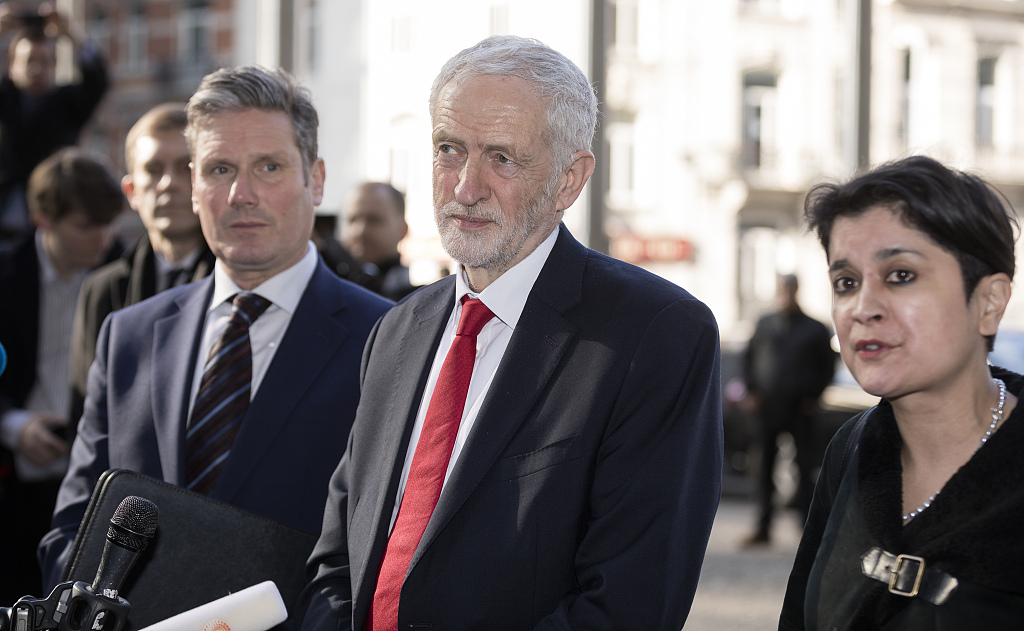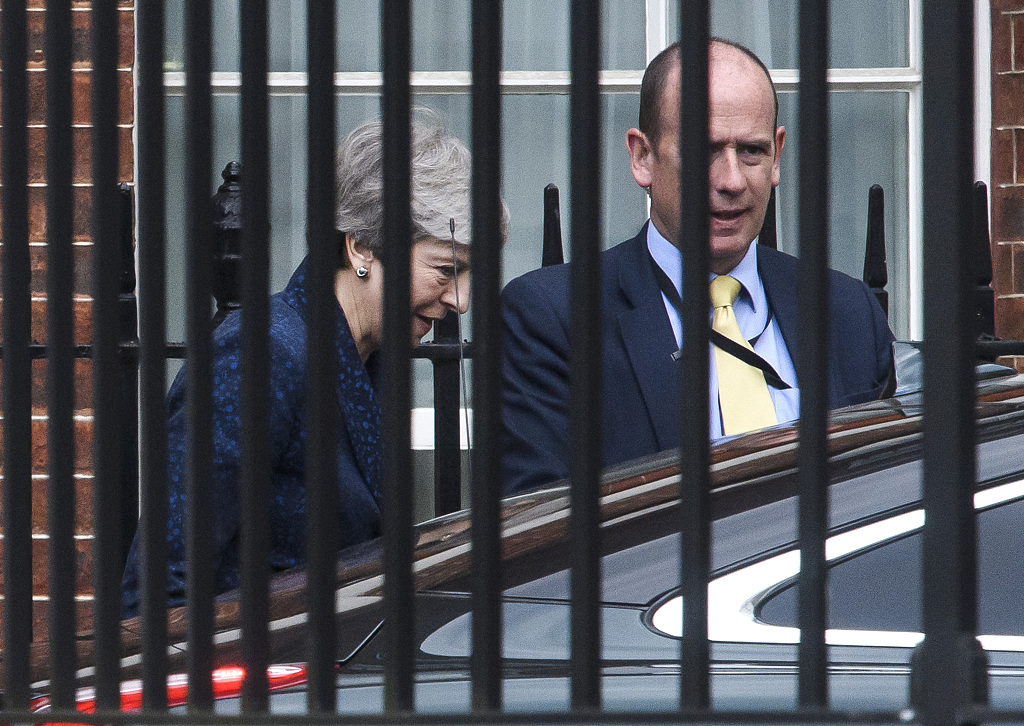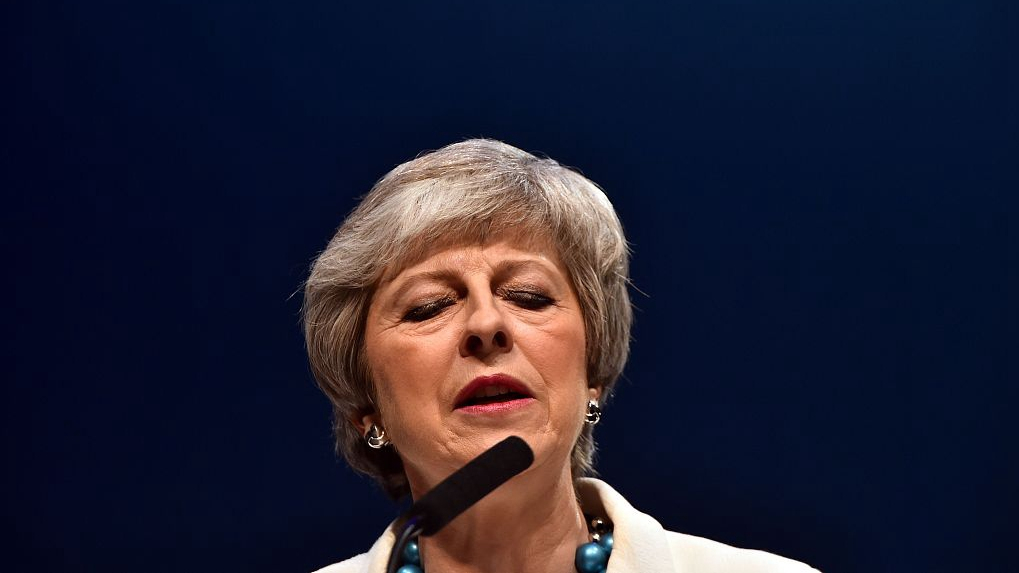Editor's Note: Tom Fowdy, who graduated from Oxford University's China Studies Program and majored in politics at Durham University, writes about international relations focusing on China and the Democratic People's Republic of Korea. The article reflects the author's opinion, and not necessarily the views of CGTN.
On Friday, Labour Party leader Jeremy Corbyn publicly announced that cross-party talks with the Conservative government pertaining to Brexit had collapsed.
Stating dialogue had gone “as far as it can,” the opposition leader blamed uncertainty surrounding Theresa May's future and those within the party seeking to replace her, criticizing the government's growing “weakness and instability.”
The Prime Minister had hoped that negotiations with the view to compromising with the Labour Party would finally get her withdrawal agreement through the House of Commons and end Britain's state of limbo with Brussels.

A handout photograph taken and released by the UK Parliament on May 15, 2019 shows Britain's Prime Minister Theresa May listening during the weekly Prime Minister's Questions (PMQs) in parliament. /VCG Photo
A handout photograph taken and released by the UK Parliament on May 15, 2019 shows Britain's Prime Minister Theresa May listening during the weekly Prime Minister's Questions (PMQs) in parliament. /VCG Photo
However, every astute observer of British parliamentary politics would have recognized that these talks were a non-starter. With Theresa May in such a position of weakness, it was never in the Labour's political incentive to bail her out save that huge concessions were made which could rectify a political victory for themselves, something she was also not politically prepared to do.
Now, the Prime Minister is rooted back to square one. With Labour inevitably going to oppose any attempts to push her deal through again, the Brexit limbo will continue. Only if she resigns as Prime Minister, calls an election or caves into requests for a 2nd referendum is there any viable off-ramp to the current status quo.
The idea of the Labour making a deal with the Conservatives to advocate Brexit was always unlikely. Although the argument put forward by the Prime Minister that to do so was in the national interest, rather than the immediate partisan interest, that is not how politics works.

British Labour leader and leader of the opposition, Jeremy Corbyn (C) talks to the media at the Berlaymont, the EU Commission headquarters on February 21, 2019, in Brussels, Belgium. /VCG Photo
British Labour leader and leader of the opposition, Jeremy Corbyn (C) talks to the media at the Berlaymont, the EU Commission headquarters on February 21, 2019, in Brussels, Belgium. /VCG Photo
Seeing that Theresa May is politically cornered by a deal she cannot pass through the House of commons, why would the opposition party salvage her fate when they can gain from her prolonged weakness? This obvious fixture made the opening price of negotiations very high.
Labour would need to obtain concessions large enough from the government for them to be able to claim victory. Anything less would be rendered a cave into the Conservatives and a betrayal of the country.
Of course, this works both ways too. How can Theresa May offer concessions to the Labour party when many in her own party are already seeing her deal as a capitulation to the European Union? It would be untenable. Thus as the talks went on, eurosceptics began working against her simultaneously, Boris Johnson announcing a future bid to oust the Prime Minister and run for leader of the Conservative Party.
Thus, with clear resentment to the Prime Minister's position and her own unwillingness to offer the Labour party serious concessions, Jeremy Corbyn decided to pull the plug on any future agreements. It was always a non-starter.
This means the Prime Minister is now back to square one. Nothing has changed since last year. She has a deal that she cannot pass through parliament. The opposition will continue to oppose it, but so will many in her own party.

PM Theresa May is seen leaving Downing Street in Westminster, London, May 16, 2019. The British Prime Minister is due to meet with the conservative group the 1922 Committee, who are demanding she set a date to stand down as PM. /VCG Photo
PM Theresa May is seen leaving Downing Street in Westminster, London, May 16, 2019. The British Prime Minister is due to meet with the conservative group the 1922 Committee, who are demanding she set a date to stand down as PM. /VCG Photo
The fact that Labour has killed the talks so soon also means that her earlier proposal of passing a bill to push forwards the legal process of Brexit with the view to making compromises later, will also fail. As it stands, Britain now has no answer to Brussels in the view to the October 31st deadline whatsoever. Any attempt to believe Theresa May's deal can suddenly be pushed through is wishful thinking.
So now what? If Britain's impasse with the EU is to be fixed, there must be a big change to the status quo. Whether she likes it or not, despite her attempts to cling on, this means Theresa May must acknowledge defeat. Thus, she must either: resign, call a general election or accept the demands for a 2nd referendum.
Remaining and sitting still is no longer feasible, because all options, which have included attempting to put her bill to the vote three times and even asking Labour for help, have now been exhausted. Anything else might as well be a denial of reality. With her own party now moving hastily against her, she might have no choice.
In summary, the failure to reach a cross-party agreement is bad news for Theresa May and Britain as a whole. Yet, the idea was always a non-starter, constrained and limited by obvious political stakes which were costly for both sides to give up.
The Prime Minister has been unable for a long time to accept the reality that her deal and her political situation are completely untenable. Now, with the last door having been closed and sealed, she might just have to accept that.
(If you want to contribute and have specific expertise, please contact us at opinions@cgtn.com.)





